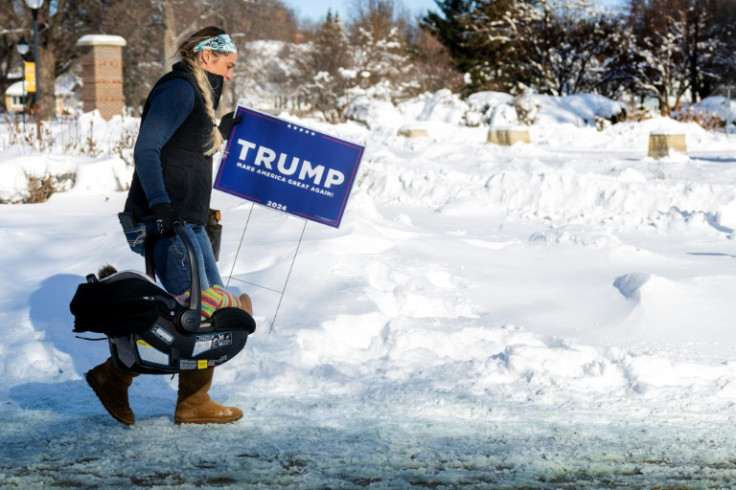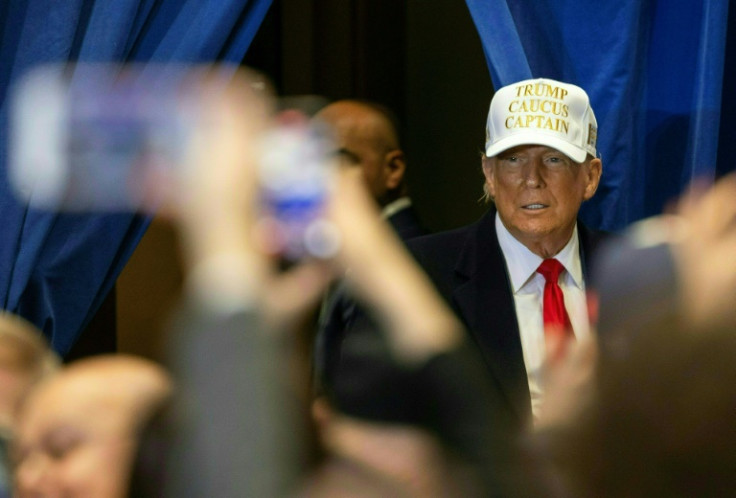Republican US Presidential Contest Kicks Off In Frigid Iowa, Testing Trump

Voters kick off the US Republican presidential nomination race Monday with caucuses in freezing Iowa, the first major test of whether Nikki Haley and Ron DeSantis have any hope against scandal-plagued front-runner Donald Trump -- or will have to accept cold political reality.
For the first time since he lost his 2020 reelection bid, the former US president -- who is being prosecuted in four criminal cases, ranging from taking top secret documents to trying to overthrow his election loss -- will face voters.
Boasting a dominant lead in opinion polls, Trump is expected to win the Midwestern state's first-in-the-nation contest handily as he bids to be the Republican standard-bearer against President Joe Biden in November.
But observers have not ruled out a surprisingly strong showing by Haley or DeSantis. Adding uncertainty, Iowans may have to contend with blizzards and a potential wind chill in some areas of -45 degrees Fahrenheit (-42 degrees Celsius), potentially throttling turnout.
"I'm asking you to go out, brave the cold and support me in the Iowa Caucus," DeSantis posted on X, formerly Twitter, early Monday. "You will never have an opportunity to have your vote make more of an impact than you will tonight!"
Trump, at a campaign event near Des Moines on Sunday, called for supporters to "dress warmly."
"Brave the weather, go out, and save America," he said.
"The biggest question I'm getting right now is: 'Is the caucus still going to take place? There is going to be a polar vortex,'" warned Maci Arjes, part of a student Republican group at the University of Iowa.
Caucuses will begin from around 7:00 pm (0100 GMT Tuesday), when voters gather in schools, libraries and fire stations across the state.
Unlike in regular elections, there is no confidential voting booth. Instead, caucus participants demonstrate their choice by gathering at a designated spot in the room, along with other like-minded voters.
Trump plans to attend several of the caucuses over the evening, his campaign told AFP.
As the first-in-the-nation contest, Iowa has an outsized impact on the primary season, often setting momentum and media narratives ahead of the next states in the calendar.
Trump is expected to win easily, but the margin of his victory will be under immense scrutiny, with anything less than a crushing margin potentially denting the sense of inevitability that he has worked hard to create.
The latest NBC News/Des Moines Register/Mediacom poll put Trump at 48 percent among likely caucus-goers.
Haley, a former UN ambassador and South Carolina governor, surged into second place but was still only at 20 percent, while Florida Governor Ron DeSantis scored 16 percent.
The Republican primary also features a number of low-polling candidates, including biotech entrepreneur Vivek Ramaswamy.
Caucuses are being held by Iowa's Democrats, along with voting by mail until March. That process, however, is all but set, with Biden seeking a second term.
Biden, whose campaign announced Monday that it had raised more than $97 million in the fourth quarter of 2023 and now has a record-breaking war chest of $117 million, faces no serious threat from his two Democratic challengers -- self-help author Marianne Williamson and Minnesota congressman Dean Phillips.

© Copyright AFP {{Year}}. All rights reserved.





















